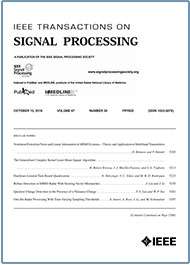- Our Story
- Publications & Resources
- Publications & Resources
- Publications
- IEEE Signal Processing Magazine
- IEEE Journal of Selected Topics in Signal Processing
- IEEE Signal Processing Letters
- IEEE Transactions on Computational Imaging
- IEEE Transactions on Image Processing
- IEEE Transactions on Information Forensics and Security
- IEEE Transactions on Multimedia
- IEEE Transactions on Signal and Information Processing over Networks
- IEEE Transactions on Signal Processing
- IEEE TCI
- IEEE TSIPN
- Data & Challenges
- Submit Manuscript
- Guidelines
- Information for Authors
- Special Issue Deadlines
- Overview Articles
- Top Accessed Articles
- SPS Newsletter
- SigPort
- SPS Resource Center
- Publications FAQ
- Blog
- News
- Dataset Papers
- Conferences & Events
- Community & Involvement
- Professional Development
- For Volunteers
- Information for Authors-OJSP
-
Home
Conferences Events IEEE Signal Processing Magazine IEEE SPL Article IEEE TIFS Article IEEE TMM Article IEEE TSP Article Jobs in Signal Processing Lectures Machine Learning Seasonal Schools Signal Processing News SPM Article SPS Distinguished Lectures SPS Newsletter Article SPS Webinar SPS Webinars SPS Webinar Series Webinar webinars
-
Our Story
What is Signal Processing?

The technology we use, and even rely on, in our everyday lives –computers, radios, video, cell phones – is enabled by signal processing. Learn More » -
Publications & Resources
-
SPS Resources
- Signal Processing Magazine The premier publication of the society.
- SPS Newsletter Monthly updates in Signal Processing
- SPS Resource Center Online library of tutorials, lectures, and presentations.
- SigPort Online repository for reports, papers, and more.
- SPS Feed The latest news, events, and more from the world of Signal Processing.
-
SPS Resources
-
Conferences & Events
-
Community & Involvement
-
Membership
- Join SPS The IEEE Signal Processing Magazine, Conference, Discounts, Awards, Collaborations, and more!
- Chapter Locator Find your local chapter and connect with fellow industry professionals, academics and students
- Women in Signal Processing Networking and engagement opportunities for women across signal processing disciplines
- Students Scholarships, conference discounts, travel grants, SP Cup, VIP Cup, 5-MICC
- Young Professionals Career development opportunities, networking
- Get Involved
-
Technical Committees
- Applied Signal Processing Systems
- Audio and Acoustic Signal Processing
- Bio Imaging and Signal Processing
- Computational Imaging
- Image Video and Multidimensional Signal Processing
- Information Forensics and Security
- Machine Learning for Signal Processing
- Multimedia Signal Processing
- Sensor Array and Multichannel
- Signal Processing for Communication and Networking
- Signal Processing Theory and Methods
- Speech and Language Processing
- Technical Working Groups
- More TC Resources
-
Membership
-
Professional Development
-
Professional Development
- Signal Processing Mentorship Academy (SigMA) Program
- Micro Mentoring Experience Program (MiME)
- Distinguished Lecturer Program
- Distinguished Lecturers
- Distinguished Lecturer Nominations
- Past Lecturers
- Distinguished Industry Speaker Program
- Distinguished Industry Speakers
- Distinguished Industry Speaker Nominations
- Industry Resources
- IEEE Training Materials
- Jobs in Signal Processing: IEEE Job Site
-
Career Resources
- SPS Education Program Educational content in signal processing and related fields.
- Distinguished Lecturer Program Chapters have access to educators and authors in the fields of Signal Processing
- Job Opportunities Signal Processing and Technical Committee specific job opportunities
- Job Submission Form Employers may submit opportunities in the area of Signal Processing.
-
Professional Development
-
For Volunteers
-
For Board & Committee Members
- Board Agenda/Minutes* Agendas, minutes and supporting documentation for Board and Committee Members
- SPS Directory* Directory of volunteers, society and division directory for Board and Committee Members.
- Membership Development Reports* Insight into the Society’s month-over-month and year-over-year growths and declines for Board and Committee Members
-
For Board & Committee Members
Popular Pages
Today's:
- Information for Authors
- Members
- MLSP TC Home
- Publications
- Information for Authors OJSP
- Video & Image Processing Cup
- (ASRU 2025) 2025 IEEE Automatic Speech Recognition and Understanding Workshop
- Access Restricted
- IEEE Transactions on Information Forensics and Security
- Signal Processing 101
- SPS BSI Webinar: Integration of Brain Imaging and Genomics with Interpretable Multimodal Collaborative Learning
- Conferences & Events
- Guidelines for Associate Editors
- Call for Papers for ICASSP 2026 Now Open!
- SPS Conference Sponsorship Information
All time:
- Information for Authors
- Submit a Manuscript
- IEEE Transactions on Image Processing
- IEEE Transactions on Information Forensics and Security
- IEEE Transactions on Multimedia
- IEEE Transactions on Audio, Speech and Language Processing
- IEEE Signal Processing Letters
- IEEE Transactions on Signal Processing
- Conferences & Events
- IEEE Journal of Selected Topics in Signal Processing
- Information for Authors-SPL
- Conference Call for Papers
- Signal Processing 101
- IEEE Signal Processing Magazine
- Guidelines
Last viewed:
- Get Involved with Technical Committees via the Affiliate TC Membership
- Members
- What Should We Learn? Bringing Wearable Sensors into the Classroom
- Editorial Board
- Postdoctoral Position in Conversational AI/ NLP/ ML at Heriot-Watt University, Edinburgh
- Board of Governors
- IEEE SPS New Course: Transformer Architectures for Multimodal Signal Processing and Decision Making
- Artistic Text Style Transfer: An overview of state-of-the-art methods and datasets
- Meet the 2024 Candidates: IEEE President-Elect and Division IX Director-Elect
- Call for Papers for ICASSP 2026 Now Open!
- (ICIP 2025) 2025 IEEE International Conference on Image Processing
- (CAI 2026) IEEE Conference on Artificial Intelligence 2026
- Member Discounts: Save on car rental
- Information for Authors
- Al-Zaytoonah University of Jordan SPS Student Branch Chapter
The Quaternion Stochastic Information Gradient Algorithm for Nonlinear Adaptive Systems
You are here
Transactions on Signal Processing
Publications & Resources
For Authors
Top Reasons to Join SPS Today!
1. IEEE Signal Processing Magazine
2. Signal Processing Digital Library*
3. Inside Signal Processing Newsletter
4. SPS Resource Center
5. Career advancement & recognition
6. Discounts on conferences and publications
7. Professional networking
8. Communities for students, young professionals, and women
9. Volunteer opportunities
10. Coming soon! PDH/CEU credits
Click here to learn more.
The Quaternion Stochastic Information Gradient Algorithm for Nonlinear Adaptive Systems
In this paper, we develop a kernel adaptive filter for quaternion data, using stochastic information gradient (SIG) cost function based on the information theoretic learning (ITL) approach. The new algorithm (QKSIG) is useful for quaternion-based kernel applications of nonlinear filtering. Adaptive filtering in quaterion domain intrinsically incorporates component-wise real valued cross-correlation or the coupling within the dimensions of the quaternion input. We apply generalized Hamilton-real (GHR) calculus that is applicable to quaternion Hilbert space for evaluating the cost function gradient. The QKSIG algorithm minimizes Shannon's entropy of the error between the filter output and desired response and minimizes the divergence between the joint densities of input-desired and input-output pairs. The SIG technique reduces the computational complexity of the error entropy estimation. Here, ITL with SIG approach is applied to quaternion adaptive filtering for three different reasons. First, it reduces the algorithm computational complexity compared to our previous work quaternion kernel minimum error entropy algorithm (QKMEE). Second, it improves the filtering performance by considering the coupling within the dimensions of the quaternion input. Third, it performs better in biased or non-Gaussian signal and noise environments due to ITL approach. We present convergence analysis and steady-state performance analysis results of the new algorithm (QKSIG). Simulation results are used to show the behavior of the new algorithm QKSIG in quaternion non-Gaussian signal and noise environments compared to the existing ones such as quadruple real-valued kernel stochastic information gradient (KSIG) and quaternion kernel LMS (QKLMS) algorithms.
SPS Social Media
- IEEE SPS Facebook Page https://www.facebook.com/ieeeSPS
- IEEE SPS X Page https://x.com/IEEEsps
- IEEE SPS Instagram Page https://www.instagram.com/ieeesps/?hl=en
- IEEE SPS LinkedIn Page https://www.linkedin.com/company/ieeesps/
- IEEE SPS YouTube Channel https://www.youtube.com/ieeeSPS
Home | Sitemap | Contact | Accessibility | Nondiscrimination Policy | IEEE Ethics Reporting | IEEE Privacy Policy | Terms | Feedback
© Copyright 2025 IEEE - All rights reserved. Use of this website signifies your agreement to the IEEE Terms and Conditions.
A public charity, IEEE is the world's largest technical professional organization dedicated to advancing technology for the benefit of humanity.











